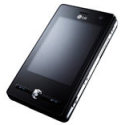Wind River to herd LiMo integration efforts
Feb 9, 2009 — by Eric Brown — from the LinuxDevices Archive — views The LiMo Foundation has chosen Wind River as the official “systems integrator” for the LiMo Platform. Wind River will provide “common infrastructure, tools, testing, and integration services,” for the Linux-based mobile phone specification, moving forward into the new LiMo R2 release, says the embedded tools company.
The LiMo Foundation has chosen Wind River as the official “systems integrator” for the LiMo Platform. Wind River will provide “common infrastructure, tools, testing, and integration services,” for the Linux-based mobile phone specification, moving forward into the new LiMo R2 release, says the embedded tools company.
(Click for larger view of the upcoming LG LiMo Phone)
Soon after its founding, LiMo named Wind River as the organization's official tools supplier. That appointment likely brought Wind River a modest number of new Workbench tool licensees. About eleven companies are contributing to the LiMo Foundation's upcoming R2 spec, LiMo says.
Now, LiMo has named Wind River its “chosen” systems integrator. In that role, Wind River will be tasked with integrating, validating, testing, and hardening code contributions from the group's various members. Wind River — one of 15 LiMo board members — says it plans to improve the efficiency of the contribution process, with the help of unnamed collaboration tools.
In the LiMo driver's seat?
While LiMo did not state so outright, Wind River's growing experience working with the LiMo codebase could position the company favorably to win additional service contracts from LiMo members. For example, it might be hired to port operator-specific application stacks to LiMo's standard middleware layer, or even to port the LiMo stack to new hardware platforms. Wind River has long hoped for a bigger role in the Linux phone market, where competitor MontaVista has had more success so far (though neither Wind River nor MontaVista supplied the Linux kernel used in T-Mobile's G1 Android phone — Google ported the kernel itself, it said).
As was recently reported, the LiMo Foundation announced that NTT DOCOMO, Orange, SK Telecom, Telefónica, Verizon Wireless, and Vodafone, had all made commitments to ship phones compliant with the LiMo specification this year. SK Telecom and Telefónica, meanwhile, have being added as new board members. In addition, LiMo announced that five Linux phone stacks have been contributed to the organization, by vendors that include Access, Azingo, LG Electronics, Purple Labs, and Samsung Electronics.
Each implementation is said to comply with the new “R2” LiMo spec, as well as with last year's R1 release, which has already been adopted by over 20 phones from Motorola, Panasonic, and NEC, and will soon be seen in new smartphones from Samsung and LG Electronics. (LG's upcoming touchscreen, 3G “LiMo Phone” is pictured at top, but few details have been released on the phone, which was originally announced a year ago.)
 Azingo Mobile 2.0 interface (Click for details) |
All code contributions to R2 have been completed, says the LiMo Foundation, and R2 will be released in final form later this year, with interim releases issued in between. LiMo R2 supports features such as advanced multimedia, location-based services (LBS), device management, and enhanced security, says the Foundation. Beyond that, LiMo did not have much to say about the new release. However, clues might be drawn from the new features of the LiMo-compliant Azingo Mobile 2.0 mobile stack announced last week. Azingo Mobile 2.0 will ship in an upcoming LiMo phone from Vodafone later this year, produced by an unnamed vendor. The widget-driven interface is packed with LBS goodies and multimedia extras, and appears to target a large-screen touchscreen smartphone equipped with GPS and accelerometers.
Stated Morgan Gillis, executive director of the LiMo Foundation. “Through its selection of Wind River as a company with a legacy of world-class embedded software, LiMo expects to be able to accelerate its goal of reducing Linux fragmentation while intensifying platform development through the rapid adoption of member contributions.”
Stated Andreas Constantinou, research director at VisionMobile, “As one of the most prominent integrators for mobile Linux stacks, Wind River fills an important gap within the new mobile economy; customization, integration, and validation of open source handset software.”
This article was originally published on LinuxDevices.com and has been donated to the open source community by QuinStreet Inc. Please visit LinuxToday.com for up-to-date news and articles about Linux and open source.